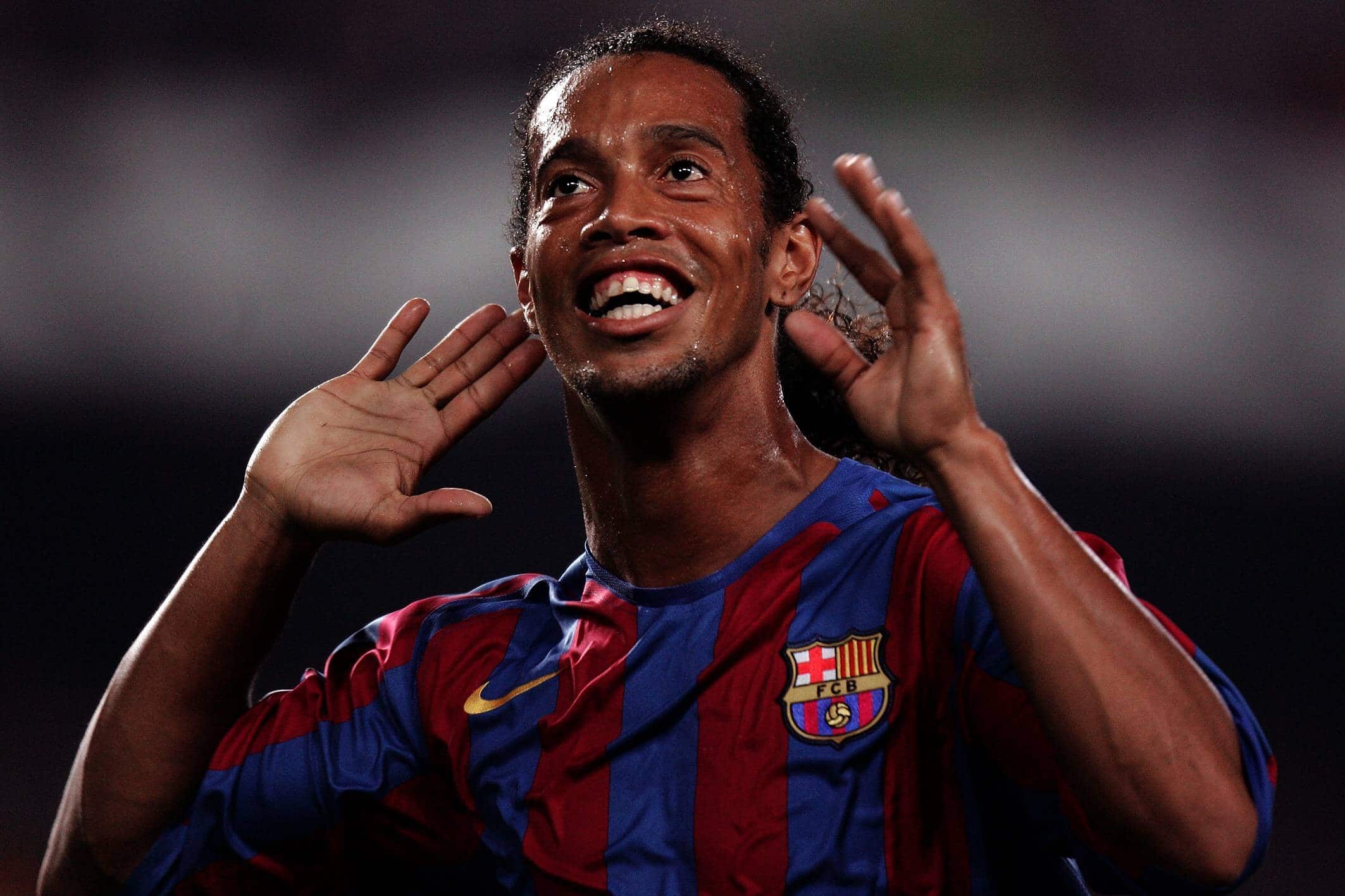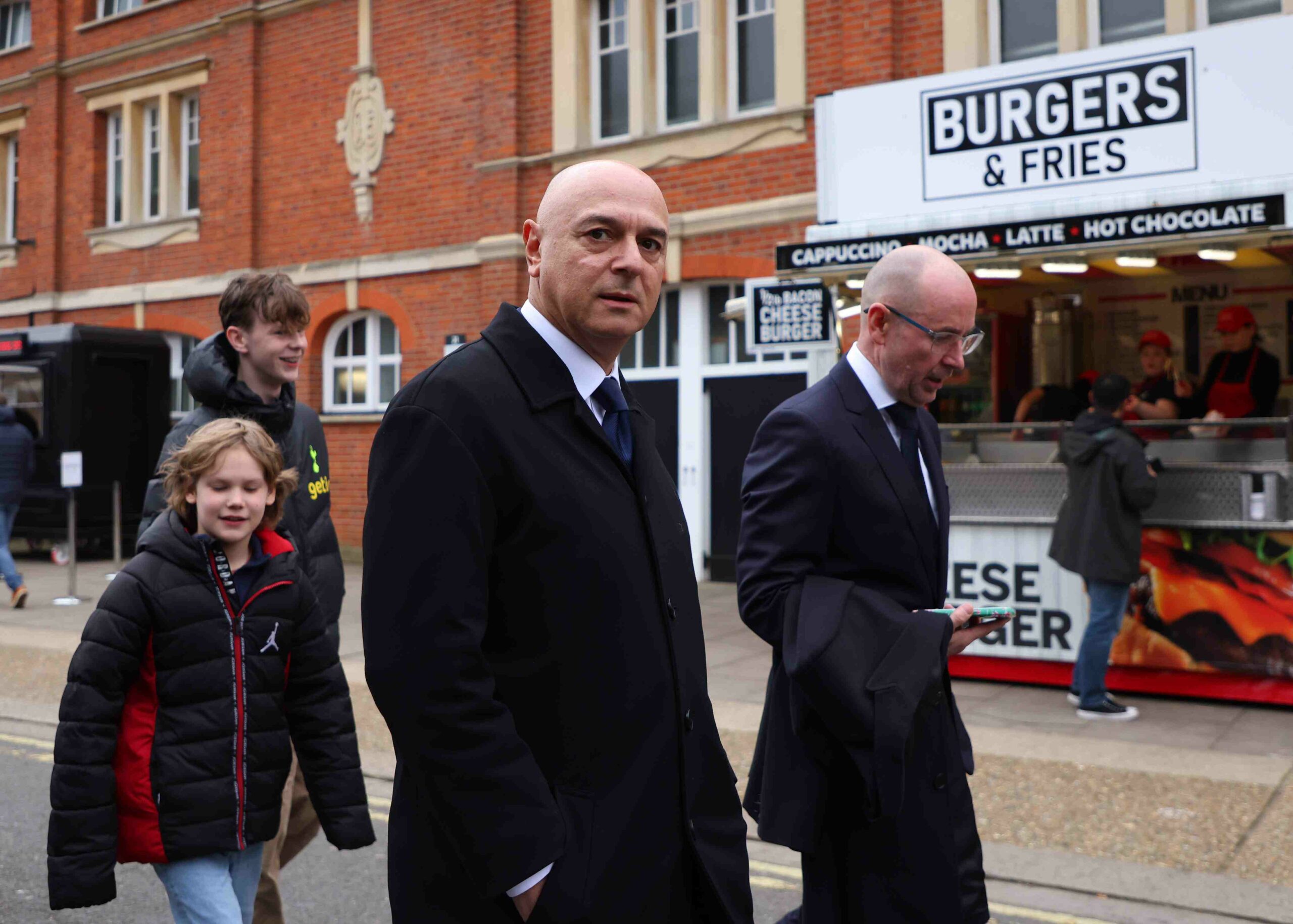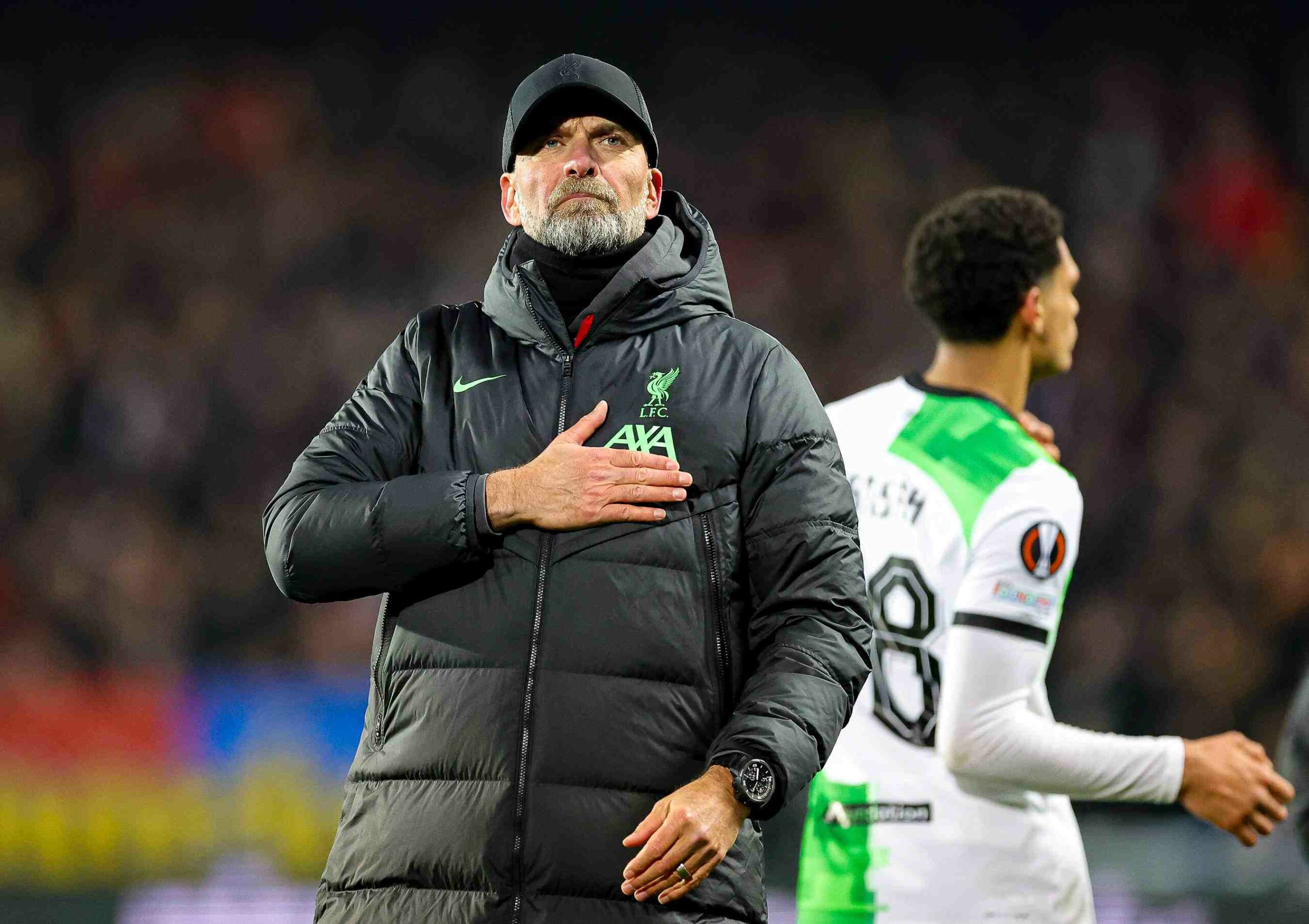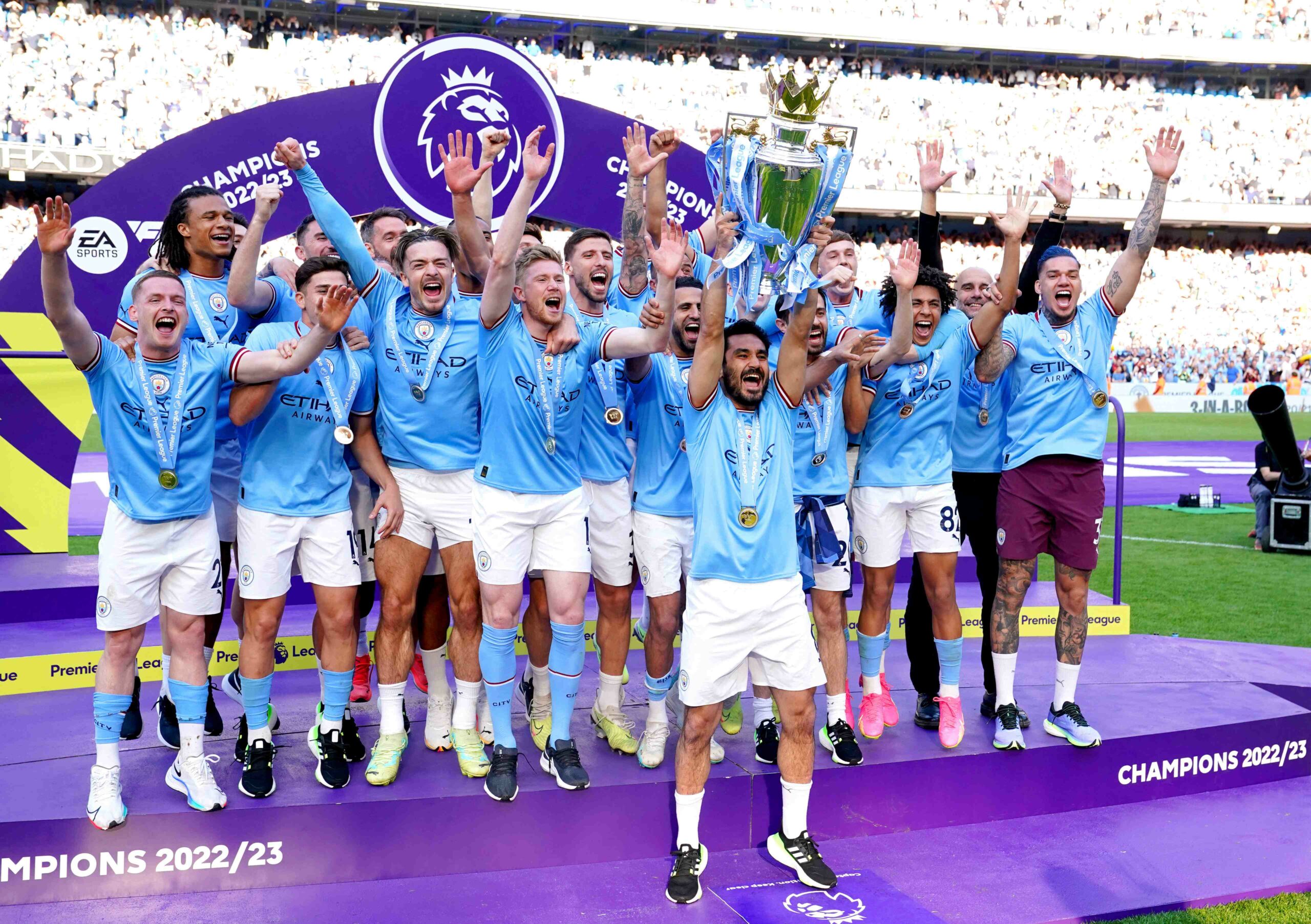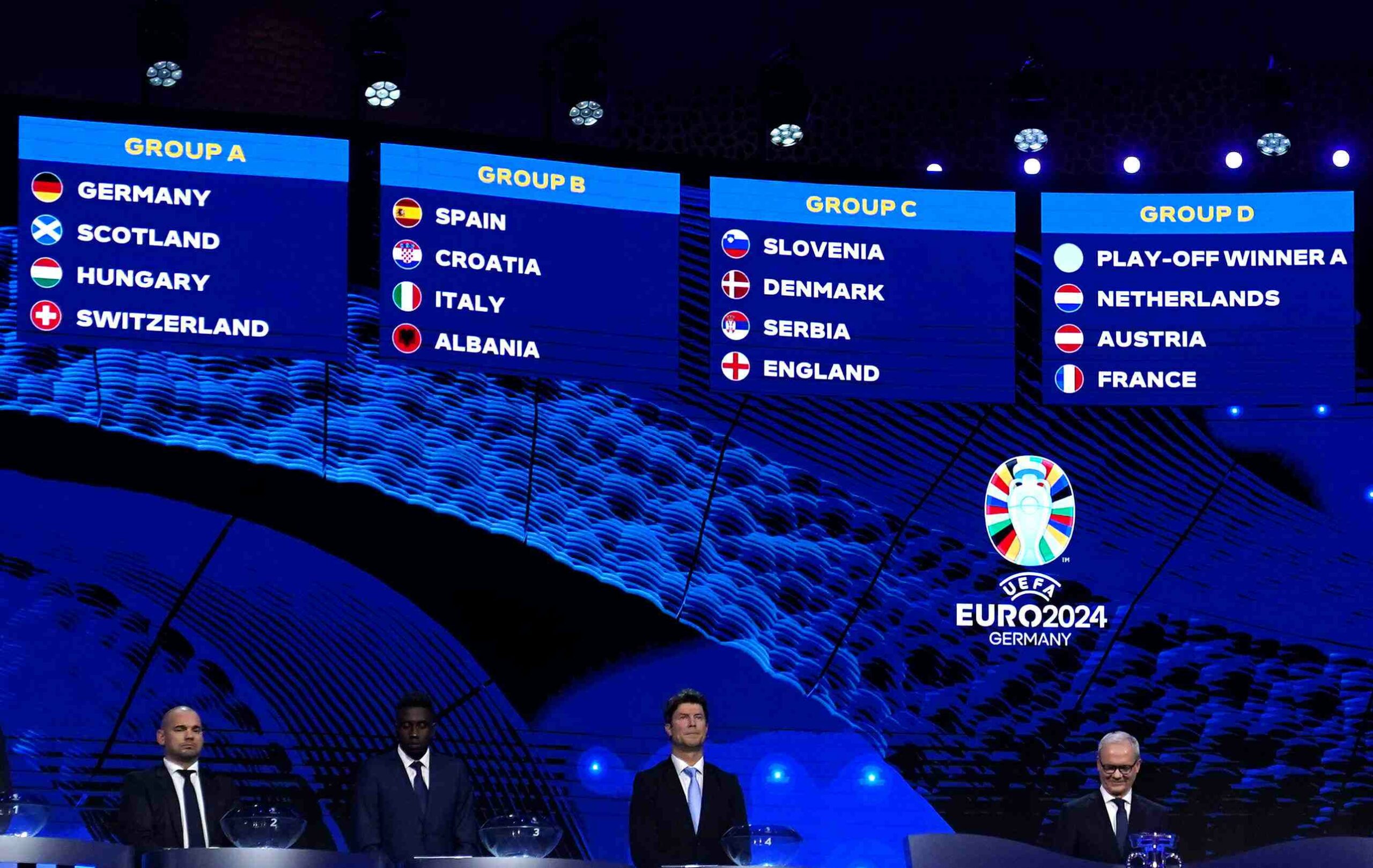Ronaldo de Assis Moreira(also known as Ronaldinho Gaúcho)
Ronaldinho was a magician on the pitch, mesmerizing fans and opponents alike with his incredible technical skills and dribbling ability. His goals and assists were a joy to watch, and he had a knack for scoring spectacular long-range strikes. As former Barcelona teammate Xavi once said, “Ronaldinho was the most talented player I ever played with. He could do things with a ball that no one else could do” .
His leadership and sportsmanship were also highly regarded, and he was known for his ability to bring out the best in his teammates. His trophy cabinet is overflowing with accolades, including multiple league titles and individual awards. There is no doubt that Ronaldinho is one of the greatest footballers of all time.
In this article, we will be taking a closer look at the amazing story of Ronaldinho’s career as a player. From his early days at Grêmio to his triumphant stints at Barcelona and the Brazilian national team, we will cover all of the highlights of Ronaldinho’s storied career. His technical ability, leadership, and sportsmanship made him a fan favourite and a true legend of the game.
So sit back, relax, and get ready to relive the career of one of football’s all-time greats playmaking attacking midfielders.
Ronaldinho: A Footballing Prodigy
Born into a family with a strong footballing background, Ronaldinho was surrounded by the sport from a young age. His father, João de Assis Moreira, was a professional soccer player and served as Ronaldinho’s mentor, while his older brother, Roberto de Assis Moreira, was also a professional footballer.
It was no surprise, then, that Ronaldinho began playing soccer at a young age and quickly showed exceptional skill and potential.
After joining the youth academy at Grêmio, a professional football club in his hometown of Porto Alegre, Brazil, Ronaldinho worked his way up through the ranks and eventually began his professional career with the club.
He quickly made a name for himself with his exceptional technical skills and creative attacking play, helping Grêmio win the Copa do Brasil in 2001 and the Campeonato Gaúcho in 2002.
Ronaldinho’s performances earned him the title of Brazilian Young Player of the Year in 2001.
It was these performances at Grêmio and Paris Saint-Germain that established Ronaldinho as one of the top young talents in world football and paved the way for his move to Barcelona in 2003.
Ronaldinho’s Success at Paris Saint-Germain
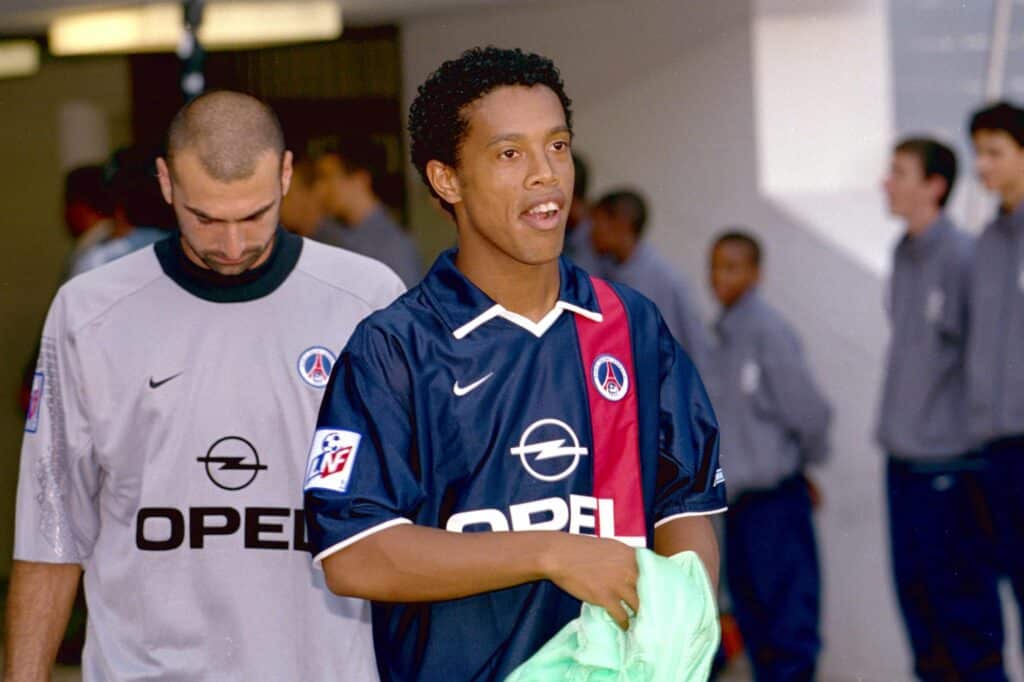
Young Ronaldinho Paris Saint-Germain (source: Imago)
After joining Paris Saint-Germain (PSG) in 2001, Ronaldinho quickly made a name for himself as a top player in the league thanks to his impressive technical abilities and attacking play.
He played a crucial role in the team’s victory in the Coupe de France in 2002. However, his manager, Luis Fernández, was not satisfied with Ronaldinho’s dedication and discipline as a player. This conflict between the manager and player ultimately led to Ronaldinho’s decision to leave PSG and seek new challenges at Barcelona in 2003.
Despite the tension, Ronaldinho’s time at PSG helped establish him as one of the top young talents in the world of football. It is possible that Ronaldinho felt frustrated with the lack of credit he received from Fernández, as he had already achieved great success at the club. Regardless of any personal feelings, Ronaldinho ultimately decided to move on and pursue new opportunities with Barcelona.
Ronaldinho’s Transfer to Barcelona: A Recap of the 2003 Move and His Time Under Frank Rijkaard
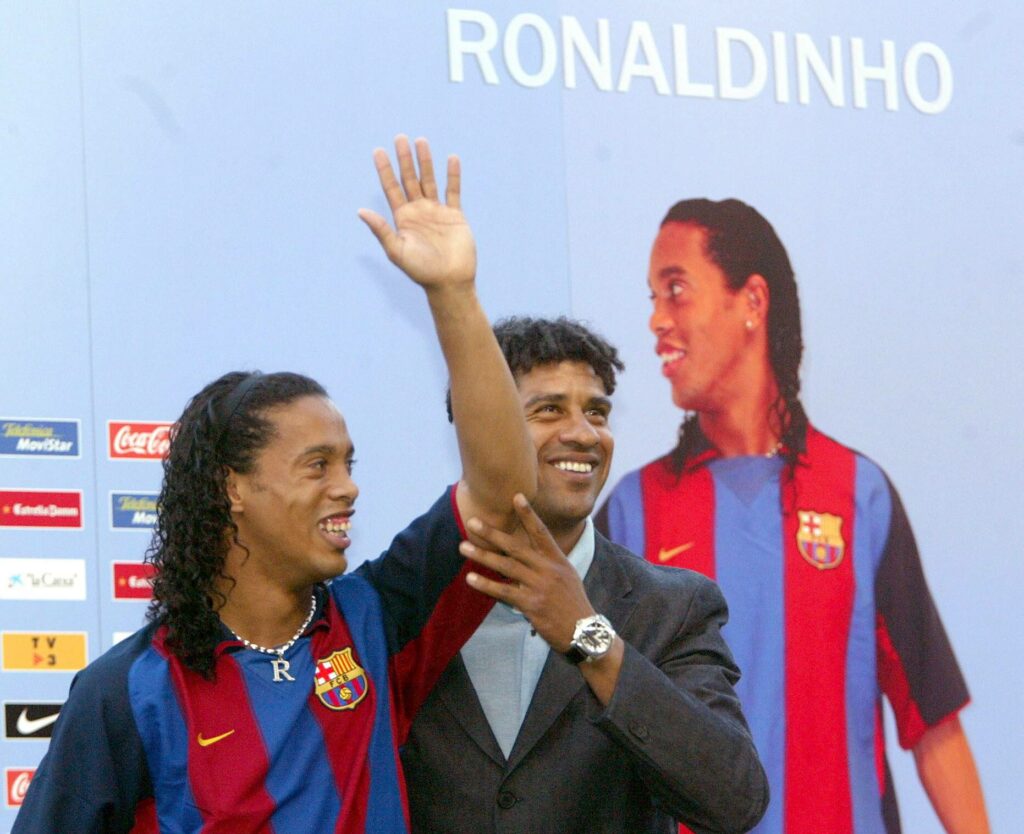
Ronaldinho’s presentation as a Barcelona Player July 21, 2003 (source: Imago)
Ronaldinho’s move to Barcelona in 2003 was a major moment in his career and helped establish him as one of the best players in the world.
He joined the Catalan club from Paris Saint-Germain in a deal worth €30 million, making him one of the most expensive players in the world at the time. Upon arriving at Barcelona, Ronaldinho immediately made an impact with his exceptional technical skills and creative attacking play.
He became a key team member and helped lead them to numerous victories, including the La Liga title in 2004/05 and 2005/06 and the UEFA Champions League in 2005/06. Ronaldinho was also named the FIFA World Player of the Year(Ballon d’Or) in 2004 and 2005, and he won numerous individual awards for his performances.
Ronaldinho’s first performance in La Liga for Barcelona was a turning point in his career and set the stage for the many successes that would come in the years ahead.
Ronaldinho spent five seasons with Barcelona, from 2003 to 2008, and made a total of 207 appearances for the club. During this time, he became one of the best players in the world and helped lead the team to numerous victories. In La Liga, Ronaldinho was a key member of the Barcelona team that won the title in 2004/05 and 2005/06. He also had some memorable performances in the El Clasico against Real Madrid, scoring several stunning goals and assists in matches against the Catalan club’s fierce rivals.
One of Ronaldinho’s best performances in the El Clasico came on November 19, 2005, in a La Liga match at the Santiago Bernabéu Stadium. In the match, Ronaldinho scored a stunning hat-trick to lead Barcelona to a 3-0 victory over Real Madrid.
He opened the scoring in the first half with a stunning free kick that curled into the top corner of the net, leaving the Real Madrid goalkeeper with no chance. He then scored twice more in the second half, completing his hat-trick and securing the win for Barcelona.
Ronaldinho’s performance in the match was exceptional, and he was praised by fans, teammates, and media alike for his skill and leadership. It was a defining moment in his career and cemented his place as one of the best players in the world.
The Arrival of Pep Guardiola and Its Impact on Ronaldinho
In 2008, Barcelona brought in a new coach, Pep Guardiola, who would go on to have a major impact on the club. One of the first decisions Guardiola made was to let go of Ronaldinho, who left to join AC Milan. This marked the end of an era for Ronaldinho at Barcelona, but it also marked the beginning of a new era for the club under Guardiola.
By the end of the year of 2006, Gaucho won almost every title out there:
Team Titles:
- Spanish La Liga (2004-05, 2005-06)
- Spanish Super Cup (2005, 2006)
- UEFA Champions League (2005-06)
Individual Awards:
- FIFA World Player of the Year (2004, 2005)
- Ballon d’Or (2005)
- UEFA Team of the Year (2004, 2005, 2006)
- FIFPro World XI (2004, 2005, 2006)
The success started to take a toll on Ronaldinho, who became less focused on training and more interested in going out clubbing and enjoying his fame.
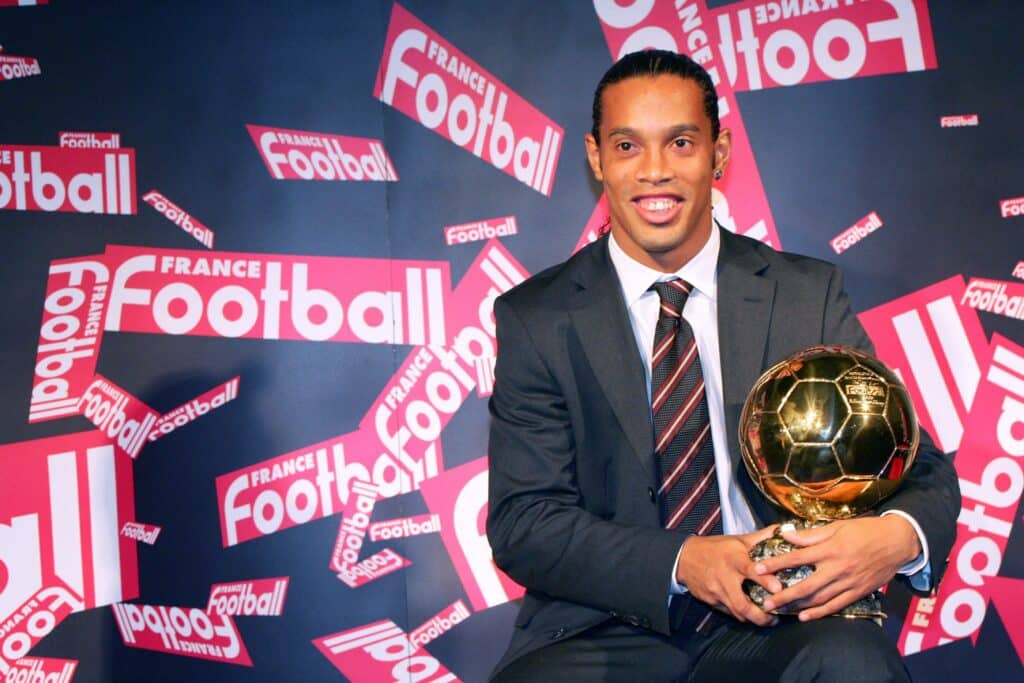
Ronaldinho after winning the Ballon d’Or award (source: Imago)
It has been reported that Ronaldinho’s discipline and commitment to training had declined in the later years of his time at Barcelona. There were instances where he showed up late to training or missed it altogether, and there were concerns about his dedication to maintaining his fitness.
It’s possible that Ronaldinho’s decline in form and discipline may have been exaggerated or misconstrued by the media. Regardless, it is clear that there were some issues with Ronaldinho’s discipline and commitment to training during his time at Barcelona, which likely played a role in the club’s decision to sell him.
Guardiola said of Ronaldinho’s departure, “I would have loved to have been able to help Ronaldinho return to the level he was at before, but I thought that it was best for the club if he left.”
Ronaldinho himself commented on his departure, saying, “I have had some wonderful years at Barcelona and I will always be grateful to the club and the fans for their support. I wish the team all the best for the future.”
Under Guardiola, Barcelona adopted a more possession-based style of play that emphasized technical ability and teamwork. This style suited many of the younger players on the team, such as Xavi, Andres Iniesta, and Lionel Messi, and helped them reach new heights. While Ronaldinho was no longer a part of the team, his influence could still be seen in the way that Barcelona played and the players that he had helped develop.
Despite his departure, Ronaldinho’s legacy at Barcelona lived on. He had been a key figure in the club’s history and had helped lead them to unprecedented success. His exceptional technical skills, creative attacking play, and memorable goals had made him a fan favourite and a player that will always be remembered in the annals of Barcelona’s history.
Ronaldinho’s Impressive Career with the Brazilian National Team
Ronaldinho was a key player for the Brazilian national team throughout his career and made a total of 97 appearances for his country. He made his debut for Brazil in 1999 under coach Vanderlei Luxemburgo and was a key member of the team that won the 2002 FIFA World Cup. In the tournament, Ronaldinho scored two goals and was named to the All-Star Team.
After the World Cup, Ronaldinho continued to be a key player for Brazil and helped lead the team to several important victories. He scored several memorable goals for his country, including a stunning free kick against England in a friendly match in 2002.
Ronaldinho was also a key member of the Brazilian team that won the FIFA Confederations Cup in 2005, scoring four goals in the tournament. He was named the Player of the Tournament and was named to the All-Star Team. This tournament is widely regarded as Ronaldinho’s best with the national team.
In an interview with FIFA.com, Ronaldinho said of his performance in the 2005 Confederations Cup, “It was a great honour for me to be named the best player in the tournament. I always try to do my best and help my team, so this is a very special moment for me”. His Brazil teammate Kaká also praised his performance, saying in that interview, “Ronaldinho is the best player in the world, and he showed that again today”.
One of Ronaldinho’s most memorable performances for Brazil came in the 2002 World Cup, when he scored a spectacular free-kick against England in the quarter-finals. The goal helped lead Brazil to a 2-1 victory and secured their place in the semi-finals.
Brazil went on to win the tournament, and Ronaldinho’s goal is still remembered as one of the greatest moments in the team’s history.
Overall, Ronaldinho’s performances for the Brazilian national team were exceptional, and he will always be remembered as one of the country’s greatest players. His skill, creativity, and leadership on the pitch helped lead Brazil to numerous victories and will be remembered for years to come.
Ronaldinho’s Decline and latter stages of his career:
After Gaucho’s successful years in Barca came the decline.
The great Ronaldinho, who used to dazzle opponents with his speed, power and elusiveness, started to look more and more like the shadow of the player he once was.
It was clear to Ronaldinho and everyone in Barca that it was the right time to move forward, and in the end of 2007, it was announced that he would be joining AC Milan in the next season.
Ronaldinho’s move from Barcelona to AC Milan in 2008 was a high-profile transfer that generated a lot of excitement among fans of both clubs.
Milan had a rich history of success and was seen as a natural fit for Ronaldinho, who was entering the latter stages of his career.
During his time at Milan, Ronaldinho was a key team member and helped lead the club to several important victories. In his first season, he helped Milan win the Serie A title, scoring 10 goals in 32 league appearances. He also helped the club reach the UEFA Champions League finals round of 16, where Manchester United eliminated them.
In the following years, Ronaldinho’s performances were somewhat inconsistent, and he could not replicate the same level of success that he had achieved at Barcelona. He struggled with injuries and weight issues, and his relationship with Milan coach Massimiliano Allegri was sometimes strained. Despite these challenges, Ronaldinho still managed to score some important goals and make a positive impact on the team.
Overall, Ronaldinho’s time at AC Milan was a successful one, and he will always be remembered as a key player in the club’s history.
In the late stages of his career, Ronaldinho’s performances, once again, became inconsistent and what was once a struggle with injuries and weight issues now became a permanent state. He had a brief stint with the Brazilian club Atletico Mineiro in 2012 but left the club after just two months due to a disagreement with the management.
After a brief period of inactivity, Ronaldinho signed with the Mexican club Queretaro in 2014. He had a successful stint with the club, scoring several important goals and helping lead the team to the semifinals of the Copa MX. However, his time with Queretaro was also marked by controversy, as he was criticized for his partying and lack of discipline.
In 2015, Ronaldinho signed with the Brazilian club Fluminense, where he played for one season before retiring from professional football. His final match was a friendly against Indian club Chennaiyin FC in July 2015.
In his later years, Ronaldinho was not able to replicate the same level of success that he had achieved earlier in his career, but he will always be remembered as one of the greatest footballers of all time.
| Club | Season | League | Regional league | Cup | Continental | Other | Total | ||||||||
|---|---|---|---|---|---|---|---|---|---|---|---|---|---|---|---|
| Division | Apps | Goals | Apps | Goals | Apps | Goals | Apps | Goals | Apps | Goals | Apps | Goals | |||
| Grêmio[224][225] | 1998 | Brasileirão | 14 | 1 | 7[a] | 2 | 2[b] | 0 | 15[c] | 3 | — | 38 | 6 | ||
| 1999 | Brasileirão | 17 | 4 | 17[a] | 15 | 3[b] | 0 | 4[d] | 2 | 6[e] | 1 | 47 | 22 | ||
| 2000 | Brasileirão | 21 | 14 | 13[a] | 11 | 3[b] | 3 | — | — | 37 | 28 | ||||
| 2001 | Brasileirão | — | — | — | — | 3[f] | 2 | 3 | 2 | ||||||
| Total | 52 | 19 | 37 | 28 | 8 | 3 | 19 | 5 | 9 | 3 | 125 | 58 | |||
| Paris Saint-Germain[226] | 2001–02 | Ligue 1 | 28 | 9 | — | 6[g] | 2 | 6[h] | 2 | — | 40 | 13 | |||
| 2002–03 | Ligue 1 | 27 | 8 | — | 6[i] | 3 | 4[h] | 1 | — | 37 | 12 | ||||
| Total | 55 | 17 | — | 12 | 5 | 10 | 3 | — | 77 | 25 | |||||
| Barcelona[224][226] | 2003–04 | La Liga | 32 | 15 | — | 6[j] | 3 | 7[h] | 4 | — | 45 | 22 | |||
| 2004–05 | La Liga | 35 | 9 | — | — | 7[k] | 4 | — | 42 | 13 | |||||
| 2005–06 | La Liga | 29 | 17 | — | 2[j] | 1 | 12[k] | 7 | 2[l] | 1 | 45 | 26 | |||
| 2006–07 | La Liga | 32 | 21 | — | 4[j] | 0 | 8[k] | 2 | 5[m] | 1 | 49 | 24 | |||
| 2007–08 | La Liga | 17 | 8 | — | 1[j] | 0 | 8[k] | 1 | — | 26 | 9 | ||||
| Total | 145 | 70 | — | 13 | 4 | 42 | 18 | 7 | 2 | 207 | 94 | ||||
| AC Milan[224][226] | 2008–09 | Serie A | 29 | 8 | — | 1[n] | 0 | 6[h] | 2 | — | 36 | 10 | |||
| 2009–10 | Serie A | 36 | 12 | — | — | 7[k] | 3 | — | 43 | 15 | |||||
| 2010–11 | Serie A | 11 | 0 | — | — | 5[k] | 1 | — | 16 | 1 | |||||
| Total | 76 | 20 | — | 1 | 0 | 18 | 6 | — | 95 | 26 | |||||
| Flamengo[226][227] | 2011 | Brasileirão | 31 | 14 | 13[o] | 4 | 5[b] | 1 | 3[p] | 2 | — | 52 | 21 | ||
| 2012 | Brasileirão | 2 | 1 | 10[o] | 4 | — | 8[q] | 2 | — | 20 | 7 | ||||
| Total | 33 | 15 | 23 | 8 | 5 | 1 | 11 | 4 | — | 72 | 28 | ||||
| Atlético Mineiro[226][227] | 2012 | Brasileirão | 32 | 9 | — | — | — | — | 32 | 9 | |||||
| 2013 | Brasileirão | 14 | 7 | 6[r] | 4 | 2[b] | 0 | 14[q] | 4 | 2[s] | 2 | 38 | 17 | ||
| 2014 | Brasileirão | 2 | 0 | 4[r] | 0 | — | 7[q] | 1 | 2[t] | 0 | 15 | 1 | |||
| Total | 48 | 16 | 10 | 4 | 2 | 0 | 21 | 5 | 4 | 2 | 85 | 27 | |||
| Querétaro[226] | 2014–15 | Liga MX | 25 | 8 | — | 4[u] | 0 | — | — | 29 | 8 | ||||
| Fluminense[226] | 2015 | Brasileirão | 7 | 0 | — | 2[b] | 0 | — | — | 9 | 0 | ||||
| Career total | 441 | 165 | 70 | 40 | 47 | 13 | 121 | 41 | 20 | 7 | 699 | 266 |
Here is a complete list of the honours and titles that Ronaldinho won over the course of his career, divided into titles won with clubs, the national team, and personal achievements:
Titles won with clubs:
UEFA Champions League: 2006 (Barcelona)
La Liga: 2004/05, 2005/06 (Barcelona)
Serie A: 2010/11 (AC Milan)
Copa del Rey: 2005/06 (Barcelona)
Supercoppa Italiana: 2011 (AC Milan)
Brazilian Série A: 2001 (Paris Saint-Germain)
Coupe de France: 2003 (Paris Saint-Germain)
Copa do Brasil: 2013 (Atlético Mineiro)
Titles won with the national team:
2002 FIFA World Cup
2005 FIFA Confederations Cup
Copa América: 2004
Personal achievements:
FIFA World Player of the Year: 2004, 2005
Ballon d’Or: 2005
UEFA Best Player in Europe Award: 2004, 2005
FIFPro World Player of the Year: 2005
Golden Foot: 2011
Brazilian Football Museum Hall of Fame: 2016
French Ligue 1 Player of the Year: 2001/02
UEFA Team of the Year: 2003, 2004, 2005
FIFPro World XI: 2004, 2005, 2006
AFC Asian Cup Team of the Tournament: 2007
South American Footballer of the Year: 2013
Brazilian Football Confederation’s Player of the Year: 2003, 2004, 2005
Mexican Primera División Best Foreign Player: 2014
